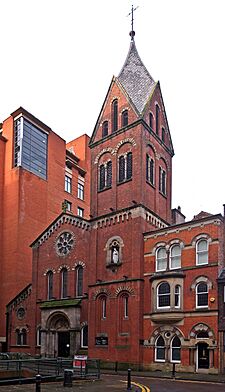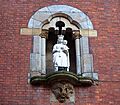The Hidden Gem facts for kids
Quick facts for kids Church of St Mary, Manchester |
|
|---|---|
| Shrine and Parish Church of St Mary, Manchester | |

Exterior of the Church of St Mary 'Hidden Gem', Mulberry Street, Manchester
|
|
| 53°28′49″N 2°14′47″W / 53.48028°N 2.24639°W | |
| Location | Manchester |
| Country | England |
| Denomination | Roman Catholic |
| Website | St Mary's |
| History | |
| Status | Active |
| Dedication | Our Lady of the Assumption |
| Consecrated | 1848 |
| Architecture | |
| Functional status | Active |
| Heritage designation | Grade II* listed |
| Designated | 18 December 1963 |
| Architect(s) | Richard Lane M. E. Hadfield |
| Architectural type | Church |
| Style | Italian, Norman, Gothic and Byzantine |
| Years built | 1844–48 |
| Specifications | |
| Number of domes | 1 |
| Materials | Stone and brick |
| Administration | |
| Deanery | St Ambrose Barlow (South Manchester) |
| Diocese | Diocese of Salford |
| Province | Province of Liverpool |
The Hidden Gem, also known as St Mary's Catholic Church, is a special church located on Mulberry Street in Manchester, England. This church has been a place of worship since 1794. It is dedicated to St Mary, specifically to her Assumption. The current church building was rebuilt in 1848. It is considered a very important historical building, listed as Grade II*. Inside, you can find the Diocesan Shrine of Our Lady of Manchester.
Contents
The Church's Early History
The first official Catholic church in Manchester after the Reformation was called St Chad's. It opened in 1774 on Rook Street. About 600 people, some traveling from far away towns like Bolton and Macclesfield, came to worship there.
During the Industrial Revolution, many Catholic families from Ireland moved to Manchester to work in the cotton factories. This meant more people needed a place to worship. The Rook Street chapel was used until it was destroyed by fire in 1846. After that, St Chad's moved to a new church built just for them in Cheetham Hill.
How St Mary's Church Began
In the mid-1790s, Father Rowland Broomhead, who was in charge of St Chad's, decided to open a second church in Manchester. He bought some land near Deansgate. He quickly started building the new church, which opened on November 30, 1794. It was dedicated to St Mary.
Some people think St Mary's was built in secret, but that's not true! Its opening was announced in local newspapers. Mulberry Street, where it's located, was a busy street with homes and shops back in the 1790s. The name 'Hidden Gem' came much later, in 1872. The Bishop of Salford, Herbert Vaughan, visited the church and said, "No matter on what side of the church you look, you behold a hidden gem."
When the Old Church Collapsed
In 1833, Father Henry Gillow, who was the priest at the Hidden Gem, thought the church building looked old and worn out. He asked some people from the church to help re-roof and re-decorate it. Unfortunately, they didn't have a professional builder oversee the work.
On August 8, 1835, at lunchtime, people heard strange cracking sounds. They looked up and saw a crack forming in the dome above the altar. The church was quickly locked up. Later that night, around 11 pm, the entire dome and part of the roof fell down. This caused a lot of damage inside the church. Services were then held in a different location on Lloyd Street while they looked for a new place to build the church.
Building the Current Church
Father Gillow sadly passed away in 1837 during a typhus outbreak in Manchester. Because of this, plans for a new church location were put on hold. Instead, they decided to rebuild St Mary's on the same spot.
They asked two architects for designs: Richard Lane and Augustus Pugin. Richard Lane's design was chosen. The architect who managed the building work was Matthew Ellison Hadfield. He later designed Salford Cathedral and the new St Chad's Church. The old St Mary's Church was completely taken down, and the new St Mary's officially opened in October 1848. The church's design mixes different styles like Norman, Gothic, and Byzantine.
Outside the Church
From the outside, the Hidden Gem is built with simple red bricks. It has a fancy bell tower and stone-framed windows. The main entrance has a beautiful stone doorway. This doorway is carved with two angels holding a medallion of the Agnus Dei, which means 'Lamb of God'. A hand above them shows the sign of the Ascension of Christ.
There's an inscription above the door that says, "Ascendamus in montem Domini. Et adoremus in loco Sancto eius". This is a mix of two Bible verses: "Come, let us go up to the mountain of the Lord" (from Isaiah 2:3) and "Praise Him in His Holy places" (from Psalms 150:1).
Inside the Church
Inside, the church has amazing Victorian carvings. The High Altar is made of marble and has finely carved, life-sized statues. These statues include Our Lady, St Stephen, St Patrick, St Peter, St John, St Hilda, St Augustine, and St Joseph. In the very center, above the tabernacle, is a statue of Christ holding the Sacred Heart.
There is also a Pietà Chapel and a Lady Chapel. The Lady Chapel is home to the Diocesan Shrine of Our Lady of Manchester. The Stations of the Cross are paintings created in 1994 by artist Norman Adams. They are done in a very strong and expressive style.
Images for kids
-
Altar and Tabernacle
-
Interior: Central Nave
-
Interior: Lady Chapel and the Diocesan Shrine of Our Lady of Manchester
-
Interior: View across the Nave from the Pietà Chapel










